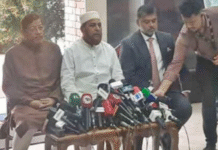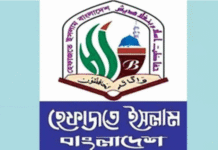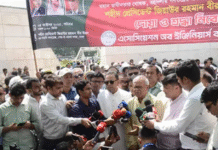
In the wake of Awami League general secretary Obaidul Quader’s comment on BNP’s silence over Supreme Court’s observation about its founder’s rule, party secretary general Mirza Fakhrul Islam Alamgir on Saturday said if Ziaur Rahman’s rule was illegitimate then Awami League’s also illegal.
‘There’s no question about the legitimacy of Ziaur Rahman’s rule. Introducing multiparty democracy and restoring people’s right to expression and press freedom can’t be illegal. Not only that, Awami League registered as a political party following due rules during his rule,’ he said.
The BNP leader also said Awami League contested parliamentary elections and it is still carrying out its political activities with the registration it got during Ziaur Rahman’s rule. ‘So, Awami League is illegal if his (Zia) rule is illegal.’
Fakhrul came up with the remarks while talking to reporters after placing wreaths at BNP founder Zia’s grave along with leaders and activists of Jatiyatabadi Swechchasebak Dal, marking its 37th founding anniversary.
Referring to the observation made in the 16th amendment verdict that dubbed Ziaur Rahman’s power grabbing illegal, Quader on Friday thanked Fakhrul for remaining silent in this regard.
Responding to it, Fakhrul said it is Awami League leaders’ old habit to mislead people by making unguarded and unnecessary remarks.
He said it is also Awami League’s strategy to divert people’s attention to a different direction from the observations of the 16th amendment verdict by talking against Ziaur Rahman’s rule.
Fakhrul said the country’s people have got deeply worried as the government is putting pressure on the chief justice to change the 16th amendment verdict. ‘They want to obliterate the independence of the judiciary and destroy the basic structures of the state. In fact, their main target is to cement their one-party rule by destroying democracy.’
Opposing the chief election commissioner’s comment that it is not their responsibility to forge unity among the political parties, he said it is also not the duty of the commission to act only on government orders.
According to the constitution, the BNP leader said it is the responsibility of the commission to ensure a proper environment so that all the political parties can join the election and all the voters can exercise their right to franchise. ‘It’s the duty of the Election Commission to bring the political parties to the election.’
He said their party has long been demanding that the next election be held under a non-party election-time supportive government as a fair and credible election is in no way possible under the partisan government now in the current context of Bangladesh.
Turning to the flood issue, Fakhrul said the government has utterly failed to tackle the flood situation and ensure adequate relief materials for the victims to ease their sufferings.
He said their party leaders and activists have been there beside the flood-hit people with relief materials since the disaster has seriously affected the country. ‘BNP first began distributing relief among the victims. We’ve already formed a central relief committee. We’re providing the victims with relief as per our ability.’
Source: New Age










On page 226 of the verdict Honourable Judges stated, “After independence, those unholy alliances of power-mongers twice reduced this country to a banana Republic, where people are seen as commodity which can be bluffed and compromised at any unworthy cost to legalize their illegitimate exercise of power.” Hardly anyone doubts that two martial laws (1975 by Mushtaq Ahmed and 1982 by Ershad) are referred by this statement regarding “Banana Republic”. Certainly Ershad tried his best to legalize his illegitimate exercise of power before he was brought down from power http://www.nytimes.com/1990/12/09/world/revolution-brings-bangladesh-hope.html
However, some people, who may think that the criticisms in the 16th amendment judgement was directed to Ziaur Rahman regime (as this verdict refers to the earlier verdicts by Khairul Haq and others on 5th and 7th amendments), must take the following facts into consideration:
1. Ziaur Rahman never proclaimed martial law, he only inherited it on 7 November 1975;
2. Rather Ziaur Rahman was the one who eventually withdrew the prevailing martial law;
3. Ziaur Rahman asked for people’s verdict through ‘yes’ – ‘no’ vote in 1978 and then later became the first directly elected President of Bangladesh through general election in February, 1979. https://en.wikipedia.org/wiki/Bangladeshi_general_election,_1979. Was this legalizing his illegitimate exercise of power?
4. Possibly not. This was evident from people’s reaction on his killing on 30 May 1981 http://news.bbc.co.uk/onthisday/hi/dates/stories/may/30/newsid_4401000/4401129.stm and the number of people attending Ziaur Rahman’s Janaza https://www.youtube.com/watch?v=4l3u02ZScc8
5. If Ziaur Rahman was unpopular to the people of Bangladesh, why his party BNP (Justice Sattar) was elected by people in 1981 election and after Ershad’s fall, in 1991 election which was held under the most acceptable caretaker authority? Ziaur Rahman’s BNP also had a landslide victory in 2001 election under the neutral caretaker government.